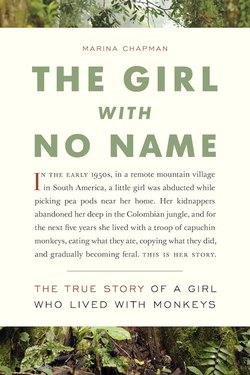Читать книгу The Girl With No Name - Марина Чапман - Страница 5
На сайте Литреса книга снята с продажи.
Prologue
ОглавлениеI have a story to tell you. The story of my life. And I had thought that this bit, where I introduce myself to you, would be the easiest thing in the world. I was wrong. In fact, it is the hardest.
When meeting someone for the first time, it’s customary to tell them your name. It’s the first thing that we all do and gives others a way to identify us. I do this. I tell people that my name is Marina. But rather than it being a name given to me by my parents at birth, this is a name I chose for myself at the age of around fourteen. My birth name, like everything else from my early childhood, has been lost over time.
The things that matter, you see – the early memories that help us to establish our identity and which most people take for granted – have, for me, long been forgotten. Who were my parents? What were their names and what were they like? I don’t know. I have no picture in my head of them at all, no hazy memories. I have no idea what they even looked like. I have so many questions that will never be answered. What was my home like and how did we live? Did I get on with my family? Do I have any siblings who remember their sister, and if so, who and where are they now? What did I enjoy doing? Was I loved? Was I happy? When is my birthday? Who am I?
For now, this is everything I know about myself: I was born sometime around 1950, somewhere in the north of South America. It is most likely to have been Venezuela or Colombia. I’m not sure which. But as most of my later life was spent in Colombia, that is where I tell people I am from.
The only real memories I have – that I can remember with sufficient clarity to be able to share them with you – are very faint and not particularly insightful. My black dolly, for instance. I do remember her. I still remember the detailing of her black frilly rah-rah skirt and the red-satin ribbons that were threaded down her blouse. Her skin was soft to touch and her hair was black and straggly; I remember how it framed her delicate, dark face.
I also remember a sewing machine. It was black with gold squiggles on the side and beside it there was a chair, on which would often be piles of fabric. Were they unfinished dresses? Perhaps my mother liked sewing? I will never know. What I do know is that my home was a humble one – our toilet was a hole in the ground. I also have a strong sense of activity going on. Of there always being lots of people around. Of the village being alive with the constant noise of children.
I recall the outside of my small world rather better. A redbrick path is very clear. I remember it ran from the house into a garden, and then on to a kind of allotment, where I am sure I spent many hours picking vegetables. I remember that place well, and alongside that memory there’s one of being called for, of being shouted at by someone to come back, to return home. Which I would mostly disobey. When this memory comes to me, it’s as if I am on the point of remembering my real name, as of course that’s what they would have been shouting. It tantalises me, remaining just outside my reach.
And what else? What other things are still clear to me? There’s an image of adults walking down a long winding hill and then toiling back up again, carrying containers full of water. I remember cars. They were very rare. No more than three or four a day came. Today, when I see mountains, something stirs in me, so I have the feeling I might have lived up in the mountains.
And that’s all I can tell you, for I know nothing more. Because one day everything changed for ever.
